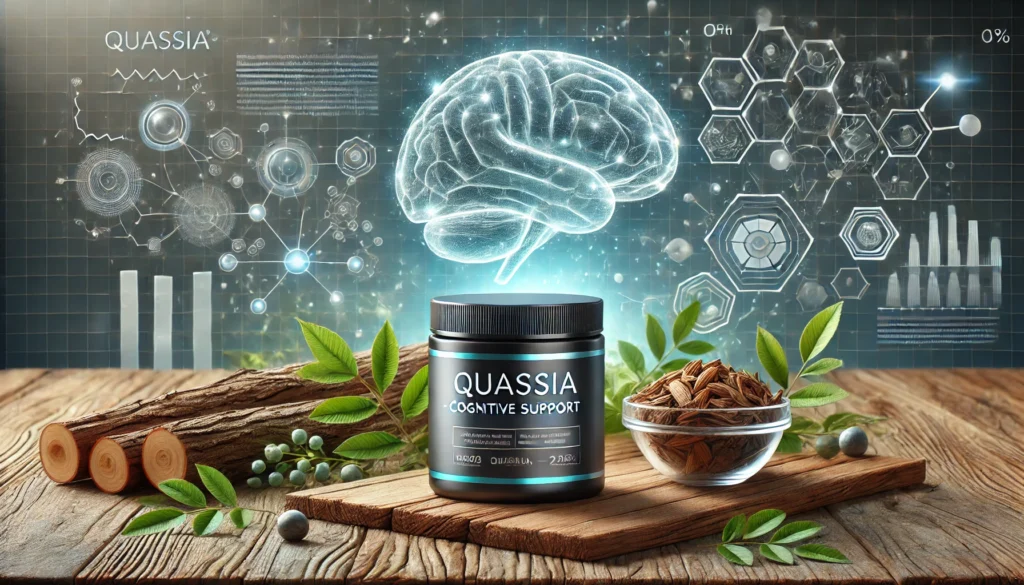Quassia, derived from the wood of the Quassia amara or Picrasma excelsa trees, has long been used in traditional medicine for its wide range of health benefits. Known for its bitter properties, Quassia is traditionally employed to treat digestive disorders, fevers, and infections. However, it has recently garnered attention in the nootropic community for its potential cognitive-enhancing effects. This article delves into the nootropic potential of Quassia, exploring its chemistry, physiological mechanisms, dosing guidelines, side effects, drug interactions, and key considerations for safe supplementation.
You May Also Like:
Quassia: Potential Nootropic Benefits, Dosage, Side Effects, Interactions, and Other Important Information About This Supplement is an original (NootropicsPlanet) article.
Source
Quassia is sourced from the bark, wood, and roots of the Quassia amara and Picrasma excelsa trees, native to South America and the Caribbean. The active compounds responsible for its medicinal properties are primarily quassinoids, a group of bitter chemical compounds known for their anti-inflammatory, anti-parasitic, and potential cognitive-enhancing effects.
Notable quassinoids include:
- Quassin: The primary bitter compound in Quassia, known for its anti-inflammatory and potential neuroprotective effects.
- Neoquassin: Another bitter compound, structurally similar to quassin, contributing to the plant’s overall bioactivity.
- Eurycomanone: A secondary metabolite found in some species of Quassia that exhibits antioxidant properties.
These quassinoids are responsible for the plant’s ability to influence various physiological processes, potentially impacting brain function, memory, and focus.

Chemistry of Quassia
Quassia’s bioactivity is attributed to its quassinoid content, particularly quassin, which is structurally categorized as a triterpenoid lactone. Triterpenoids are a class of chemical compounds with a wide variety of biological activities, including anti-inflammatory and neuroprotective properties. Quassin and its analogs work through multiple pathways in the body, influencing cellular health and potentially cognitive function.
In the brain, quassinoids like quassin may act as modulators of inflammatory pathways and oxidative stress, both of which are closely linked to neurodegenerative diseases and cognitive decline. By reducing oxidative damage in neural tissues, quassin may play a neuroprotective role, similar to other antioxidants.
Physiological Mechanisms of Quassia in the Body and Brain
Quassia’s physiological mechanisms are multifaceted, affecting various systems in the body, including the digestive and immune systems. Its impact on the brain, particularly as a nootropic, stems from its influence on oxidative stress and neuroinflammation, as well as its ability to modulate neurotransmitter systems.
Key mechanisms of action in the brain include:
- Antioxidant Properties: Quassin and other quassinoids help neutralize free radicals, reducing oxidative stress in neural tissues. This is critical for brain health, as oxidative damage is a contributing factor to cognitive decline and neurodegenerative diseases such as Alzheimer’s and Parkinson’s disease.
- Anti-inflammatory Effects: Quassia’s anti-inflammatory action helps to reduce neuroinflammation, a major contributor to cognitive impairment and brain aging. By inhibiting inflammatory cytokines and other pro-inflammatory mediators, Quassia may support healthy brain function.
- Neurotransmitter Modulation: Emerging evidence suggests that quassinoids may influence neurotransmitter systems, particularly the cholinergic system, which is critical for memory and learning. By modulating acetylcholine levels, Quassia could enhance synaptic plasticity and cognitive performance.
- Anti-fatigue and Cognitive Enhancement: Anecdotal reports suggest that Quassia may reduce mental fatigue and improve focus, possibly due to its adaptogenic-like effects on the body and brain. However, scientific studies are still limited, and further research is necessary to confirm these potential nootropic benefits.

Nootropic Benefits of Quassia
Quassia has several potential benefits that make it a candidate for cognitive enhancement. Though it is primarily used for digestive and immune support, its antioxidant and anti-inflammatory properties lend it neuroprotective qualities that may be beneficial for brain health.
- Improved Cognitive Function: Through its antioxidant and anti-inflammatory mechanisms, Quassia may support cognitive function by protecting neurons from oxidative damage and reducing neuroinflammation. This is especially important in the context of aging, where oxidative stress and inflammation contribute to cognitive decline.
- Mental Clarity and Focus: Some users report that Quassia improves mental clarity and focus, likely due to its potential effects on neurotransmitter modulation and synaptic plasticity. By supporting cholinergic activity, Quassia may enhance attention and memory retention.
- Neuroprotection: Quassia’s neuroprotective properties make it a promising candidate for preventing or slowing the progression of neurodegenerative diseases. By reducing oxidative damage in the brain, Quassia could help protect against conditions like Alzheimer’s and Parkinson’s disease.
- Anti-fatigue Effects: Preliminary research suggests that Quassia may have adaptogenic properties, helping to reduce mental fatigue and enhance cognitive performance under stress. This makes it a potentially useful supplement for those experiencing mental burnout or cognitive fatigue.

Dosage and Supplementation Guidelines
There is no standardized dosage for Quassia supplementation, as its use as a nootropic is relatively new and under-researched. However, traditional medicinal use provides some insight into safe dosage ranges. Most studies and anecdotal reports recommend the following guidelines:
- General Nootropic Dosage: For cognitive enhancement, doses between 200 mg to 500 mg of standardized Quassia extract per day are commonly used. This dosage provides enough quassinoids to exert potential nootropic effects without causing adverse reactions.
- Digestive Support Dosage: For digestive issues, such as indigestion or parasitic infections, higher doses of 500 mg to 1,000 mg of Quassia extract may be employed, but these are typically used under medical supervision.
- Supplement Forms: Quassia is available in several forms, including capsules, tinctures, and teas. Capsules are the most convenient for consistent dosing, while tinctures and teas are used traditionally for digestive and immune support.
Side Effects and Safety
Quassia is generally considered safe when used at recommended doses. However, like any supplement, it can cause side effects, particularly when taken in high doses or for prolonged periods.
Common side effects include:
- Gastrointestinal Distress: Due to its bitter nature, Quassia may cause nausea, vomiting, or diarrhea, especially when taken in high doses. Its use as a digestive tonic is generally well-tolerated, but sensitive individuals may experience discomfort.
- Low Blood Pressure: Quassia may lower blood pressure, particularly in individuals who are already hypotensive. Caution is advised for those with low blood pressure or those taking antihypertensive medications.
- Allergic Reactions: Although rare, allergic reactions to Quassia can occur, presenting as skin rashes, itching, or swelling. Individuals with known sensitivities should avoid Quassia or consult a healthcare provider before use.

Interactions with Other Supplements and Medications
As with any supplement, it is important to consider potential interactions with other drugs and supplements. Quassia may interact with several classes of medications, particularly those that affect blood pressure, liver function, or gastrointestinal health.
Key interactions include:
- Antihypertensive Drugs: As Quassia may lower blood pressure, it could potentially enhance the effects of blood pressure-lowering medications. Individuals taking antihypertensives should monitor their blood pressure closely and consult a healthcare provider before using Quassia.
- Anticoagulants: Quassia may have mild blood-thinning effects, so caution is advised for individuals taking anticoagulant medications like warfarin or aspirin. This interaction could increase the risk of bleeding.
- Liver Metabolism: Quassia is metabolized by the liver, and individuals with liver disease or those taking medications that affect liver function (such as statins or antifungals) should use Quassia with caution. In rare cases, it may exacerbate liver conditions.
- Digestive Enzymes and Antacids: Quassia’s bitter compounds stimulate the production of digestive enzymes. While this can be beneficial for digestion, it may interact with antacids or other medications that alter stomach acidity, potentially reducing their efficacy.
Risks for Individuals with Certain Health Conditions
While Quassia is generally safe for most people, certain health conditions may necessitate caution when using this supplement.
- Pregnancy and Lactation: Quassia is not recommended for pregnant or breastfeeding women due to its potential effects on uterine contractions and milk production. It is also advisable to avoid Quassia during these periods due to a lack of research on its safety in these populations.
- Gastrointestinal Disorders: Individuals with gastrointestinal disorders such as ulcers or irritable bowel syndrome (IBS) may experience exacerbated symptoms from Quassia’s bitter properties, which stimulate digestive secretions. Those with known GI sensitivities should approach Quassia with caution.
- Liver and Kidney Disease: As mentioned earlier, Quassia is metabolized by the liver and excreted through the kidneys. Individuals with liver or kidney disease should avoid high doses of Quassia and consult with their healthcare provider before use.
Conclusion:
Is Quassia a Viable Nootropic Supplement?
Quassia holds promise as a nootropic supplement due to its antioxidant, anti-inflammatory, and potential neurotransmitter-modulating properties. While the research on Quassia’s cognitive-enhancing effects is still in its early stages, its traditional use in herbal medicine, coupled with its biological activity, suggests that it may support cognitive health, especially in the context of neuroinflammation and oxidative stress.
However, individuals interested in using Quassia as a nootropic should approach it with caution, particularly due to its side effects and potential interactions with other medications. Always consult with a healthcare provider before adding Quassia or any new supplement to your regimen, especially if you have underlying health conditions or are taking other medications.

References:
- Quassia – Uses, Side Effects, and More. Retrieved from: https://www.webmd.com/vitamins/ai/ingredientmono-290/quassia
- Phytochemistry, Traditional Use and Pharmacological Activity of Picrasma quassioides: A Critical Reviews. Retrieved from: https://pmc.ncbi.nlm.nih.gov/articles/PMC7551903/
Important Note: The information contained in this article is for general informational purposes only, and should not be construed as health or medical advice, nor is it intended to diagnose, prevent, treat, or cure any disease or health condition. Before embarking on any diet, fitness regimen, or program of nutritional supplementation, it is advisable to consult your healthcare professional in order to determine its safety and probable efficacy in terms of your individual state of health.
Regarding Nutritional Supplements Or Other Non-Prescription Health Products: If any nutritional supplements or other non-prescription health products are mentioned in the foregoing article, any claims or statements made about them have not been evaluated by the U.S. Food and Drug Administration, and such nutritional supplements or other health products are not intended to diagnose, treat, cure, or prevent any disease.


